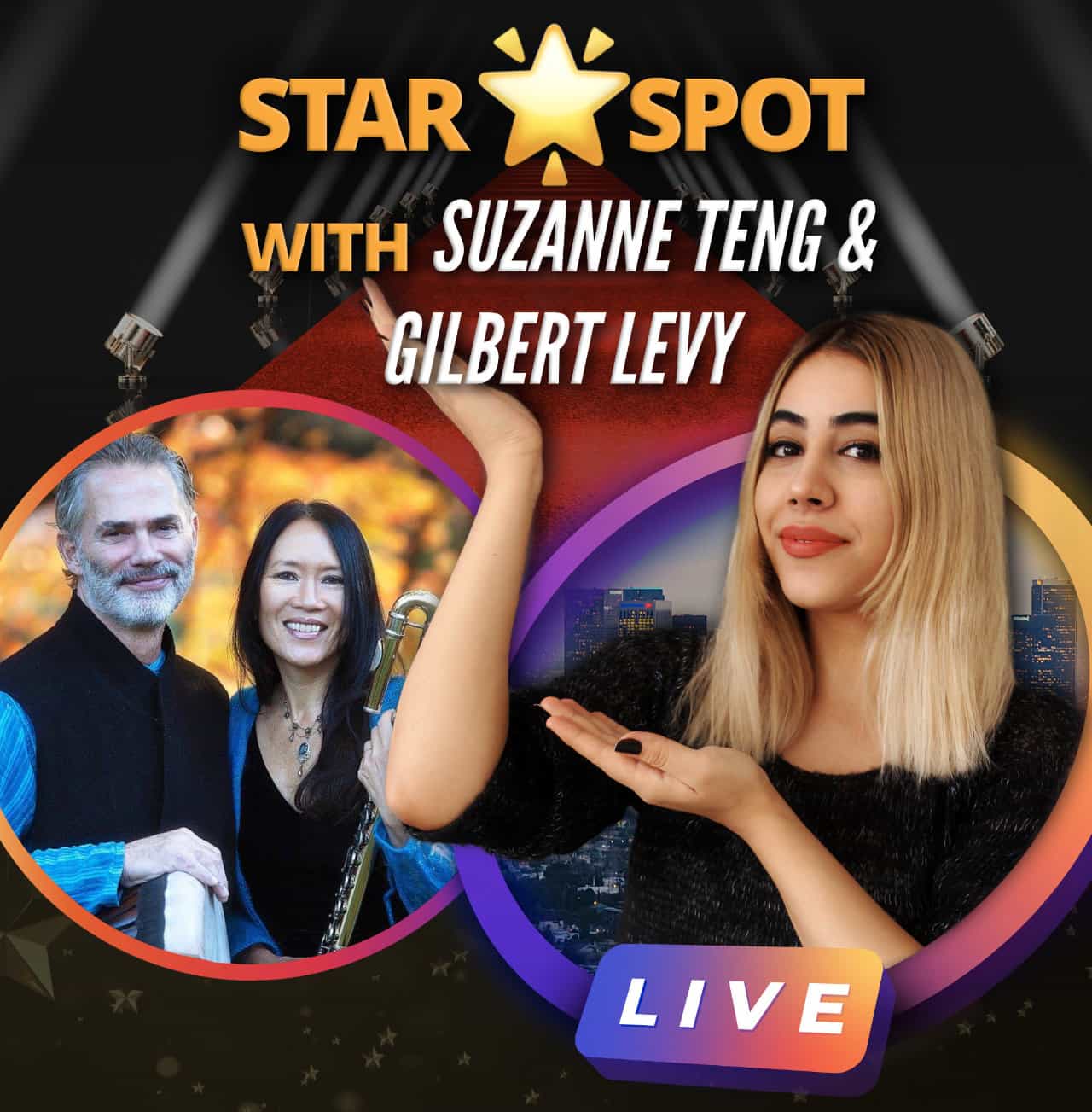Star Spot with Suzanne Teng and Gilbert Levy
Musical Journeys and Inspirations: An Interview with Suzanne Teng and Gilbert Levy
Welcome to this episode of Star Spot! I’m Merry, and in this series, I interview InterContinental Music Awards winners and insiders, bringing you exclusive insights into the music industry. Today, I’m thrilled to have Suzanne Teng and Gilbert Levy, our brilliant winners of 2022, two of the most talented and accomplished musicians in the world of music competition and music contest.
Suzanne Teng is a renowned flutist who has been described by the Los Angeles Times as a “brilliant flutist” who “plays music for the soul.” With a Master’s degree in music from Boston University and a Ph.D. in ethnomusicology from UCLA, Suzanne has dedicated her life to world music and healing. She plays an extensive array of flutes from around the world, which allows her to translate her skills to hundreds of ethnic wind instruments in her collection.
Gilbert Levy, on the other hand, is a highly experienced drummer who has performed with some of the greatest jazz legends and R&B bands of our time. With years of experience in pop, rock, jazz, R&B, and world music, Gilbert has the unique ability to create rhythms that are musical and music that is rhythmic. His expressive and exuberant performances have made him a standout in the music industry.
In this interview, Suzanne Teng and Gilbert Levy will share their challenges, inspirations, and experiences that have led them to become InterContinental Music Awards winners. Let’s dive right into the interview summary and tap into Suzanne and Gilbert’s vast knowledge and experience. The full interview is available on Instagram – click here to check it out.
Could you provide a brief biography of yourself Suzanne?
Hi, I am Suzanne Teng, a musician who has lived in Santa Fe, New Mexico, for a while now. I started my musical journey with the piano and violin, but I eventually found my voice with the flute when I was ten. In my 20s, I pursued a classical music career and earned my master’s degree in classical flute performance. However, my life took a turn when I met an African drummer who introduced me to world music, which changed my perspective on music entirely.
After moving to Los Angeles and studying ethnomusicology at UCLA, I began exploring different styles of music and expanded my vocabulary. I started playing with rock bands, reggae bands, and discovered my love for creating music. After changing my band’s name from Topanga to Mystic Journey, I joined forces with my husband, Gilbert, and released three albums in the past four years.
Gilbert, could you also provide a brief biography of yourself?
I’m originally from New Orleans, Louisiana, a town that’s steeped in music history. I grew up surrounded by pop and jazz music, and when I moved to California, I expanded my musical repertoire to include hand drums like Conga and Jim Bay. However, it wasn’t until I heard the amazing drummer and tabla player, Trilok Gurtu on the radio, that my life changed. I immediately bought a set of tabla and started studying with a teacher who has since passed away.
Tabla became a part of my musical vocabulary, and I developed a desire to play ethnic instruments from all over the world.This desire was fed by meeting the “ethnic instrument queen,” Suzanne, who also shared my addiction for exotic instruments. We started recording together, and it was epic. Eventually, we got married, and now we’re in New Mexico with a more reasonable lifestyle than Los Angeles.
Santa Fe is a great place to raise our son, who’s now in college on the East Coast. We’ve been able to be more prolific with our music since we have our own studio and engineer all our stuff. We’ve done four releases, and we’re on a roll now with an in-house life that we dreamed about.
Where does the inspiration behind your music come from?
Suzanne Teng : Wow, I think the inspiration for my music comes from a lot of different places, depending on the album or piece. For example, our most recent album, “Alive,” was inspired by the energy of live performances, while our previous album, “Whisper,” was created during the pandemic as a soothing and healing experience. We wanted to create something that was quiet and intimate, and that’s how the title “Whisper” came about.
When we have our band, the inspiration is more for a lively party feeling with lots of dancing and drumming. One of our albums, “Enchanted Wind,” is designed for deep meditation and calming, and it was the one we used to put our son to sleep at night when he was little.
So, in essence, the inspiration behind our music comes from a big range of emotions and experiences that we hope to convey through our music.
Gilbert, can you give us an insight into your creative process? How does it work? How do you begin working on a new piece of music?
Gilbert Levy: Sure, I’d love to. My creative process has evolved over the years, especially after I had a right-hand injury that forced me to rethink my approach to music. I now rely more on strings and keyboards to compose music, which has opened a new lane for me.
When starting a new piece of music, I usually begin on the keyboard or one of my unique string instruments. Such as the baglama, a Turkish instrument. I’ll create a skeletal pass, and then my musical partner will come in and add their touch. From there, we flow together, improvising and adding or removing instruments until we have a framework that we’re both happy with.
One luxury we have now is being able to engineer ourselves, which means we can dive deeper into our creative process without worrying about the clock. It’s a collaborative effort that’s always evolving, and we’re constantly trying to push ourselves to new heights.
As an independent artist, how have you sustained your career in the music industry?
Suzanne Teng: It’s been a process, as I’ve been doing this for a long time. One thing that has helped is teaching music, specifically flutes. I’ve been teaching since I was 14 and now I teach workshops and clinics all around the country. Another way I’ve sustained my career is through the streaming world.
It’s been really helpful for us. Additionally, people license our music, which has been nice. I also sell Indonesian flutes that I had made, which has become a successful venture. It’s just finding all the different ways of getting income, and a big mantra has been passive income. The InterContinental Music Awards caught my attention on Facebook, as I’m friends with a lot of other musicians in our genre, and someone had mentioned it. That’s how we entered.
How have you adapted to the changing music industry; especially as live shows have become less common?
Suzanne Teng: The music industry has changed over the years. Live shows are fewer for us, and I would guess for a lot of musicians. So, we’ve had to find other ways to make a living. That’s where passive income comes in. Royalties have been helpful, as it’s nice to not have to continually sell CDs. Additionally, streaming has been a great way to reach more people. It’s just about finding new avenues to make money and adapting to the changing industry.
How was your experience with ICMA and what was your takeaway?
Suzanne Teng: Our experience with ICMA was personable, and we appreciated that they took the time to really hear from us and didn’t just treat us as an entry. It was a nice experience for us to receive the award plaque.
Gilbert: it feels good to be recognized, and we want to take the opportunity to give a shout out to our longtime band members who have been with us for more than 10 years.
What are some of the challenges you have faced throughout your musical career?
Gilbert Levy: Well, one of the biggest challenges has been navigating the constantly changing music industry. It’s not like it used to be where you could make a living off record sales and touring alone. As an independent artist, I’ve had to find new ways to generate income and sustain my career. Another challenge has been dealing with the ups and downs of the music business. From the highs of receiving an award to the lows of not getting gigs or not being able to sell as many CDs.
But I’ve learned to take it all in stride and focus on the positives, like the amazing connections and relationships I’ve built with fans and other musicians over the years. There are also practical challenges of being a musician, like finding the time and energy to practice, write, and perform while also managing the business side of things. But overall, it’s been a rewarding journey and I wouldn’t trade it for anything.
Suzanne Teng: one of the challenges was learning how the business industry works and trying to keep up with it. I admit to making big mistakes, but I embrace them as part of the process. As a flutist, I also struggled with the competitive nature of the classical music world. However, as I evolved, I realized that honoring who we are as individuals is crucial. So, I encourage young flutists to be open to the path presented to them and not to confine themselves to one vision.
I believe that being unique and finding one’s niche is vital to becoming successful in the industry. Feel grateful that I found my path and do not have as many struggles because I explored different opportunities. I acknowledge that my life experiences, both musically and as a person, contributed to who I am today.
What is the best advice you have ever received on your music career?
Gilbert Levy: The best advice I have received on my music career came from my friend and mentor, Suzanne. Over the years, she has always reminded me to stay true to myself. I didn’t have many mentors growing up, and my tablet teacher was very formal and didn’t offer much personal guidance. So Suzanne’s advice has been invaluable to me. She has encouraged me to stay authentic and genuine, which has helped me to develop my own unique style as a musician.
Suzanne Teng: It’s difficult to pinpoint just one piece of advice, but I’ve been fortunate enough to have several mentors who have been incredibly influential in my career. One of my most significant mentors is my flute teacher, Leon Bicy. She has been a guiding force in my life since I was 19 years old. And has always inspired me to work hard and persevere. She didn’t necessarily give me verbal advice, but she planted little seeds of confidence and ideas in me that I’ll never forget.
For example, she took me to a concert featuring the Japanese drummers, Kodo, knowing I was interested in world drums. It was incredibly inspiring. I’m currently putting together a video tribute to her for her retirement party because of how much she has meant to me and my career.
Are there any last words you’d like to share with your fans and our viewers?
First, I want to thank you for this lovely interview. It’s been a pleasure talking to you. To my fans and viewers, I just want to express how grateful I am to be part of this incredible community. I hope my music continues to inspire and uplift you.
Suzanne Teng and Gilbert Levy Contact Info:
- Website: https://mysticjourney.net
- Instagram: https://www.instagram.com/suzteng/
- Spotify: https://open.spotify.com/artist/3aYRdqtlRN3NiwTzXfUtQD
Click here to watch the full interview of Suzanne Teng and Gilbert Levy on Instagram
InterContinental Music Awards Team


